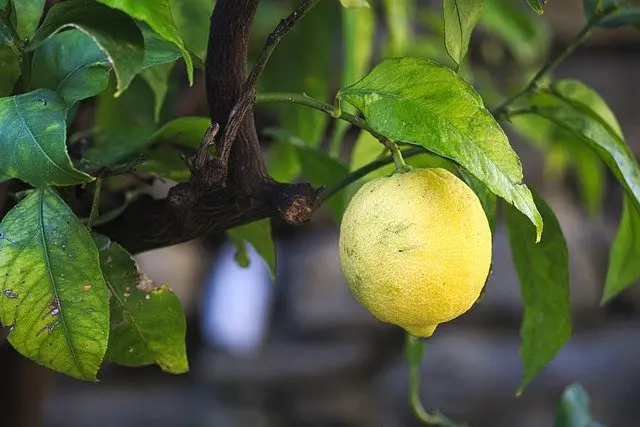Eggshells can be beneficial to some plants and so gardeners would obviously wonder if it can do wonders for their lemon tree.
Eggshells are extremely rich in Calcium. But, that’s not all this material contains! There are also trace amounts of Selenium and Magnesium.
These happen to be some minerals that every plant and tree needs for growth and fruit production. This includes lemons as well.
Trees that lack nutrients and minerals could show below-par growth. Or even worse they can develop poor lemons that are tasteless! This means that making sure the trees have everything is important.
Let’s read more about what eggshells can do for your lemon trees.
Do Lemon Trees Benefit From Eggshells?
Indeed your lemon trees can greatly benefit from having eggshells in their soil. It will impart a lot of calcium to the soil among a few other minerals that would be otherwise quite hard to naturally provide to your lemon trees.
Sure fertilizers can provide all the nutrients and minerals your lemon tree needs to produce large and healthy lemons. But, it’s always better to try to provide the minerals and nutrients in a natural form rather than an artificial one.
Lemon trees get a lot of Calcium from eggshells. With enough eggshell material in the soil, your lemons may not need any other source of Calcium.
But that’s not all that they have to offer your lemon tree. Eggshells could even help in defense against disease as well as improve soil pH. This material has what it takes to keep your soil acidic enough for your lemon trees.
Lemon trees grow best in soil with a pH between 5.5 and 6.5, this means mildly acidic soil. They are highly intolerant towards alkaline soil and thus an acidifying substance is very important for soil maintenance.
Thus, eggshells are the multi-purpose material your lemon tree soil needs. Using it will save money and put to good use a material that has no other purpose!
Never grown a lemon tree before? Find out: Do lemon trees have thorns?
How to Use Eggshells to Fertilize Your Lemon Trees?
You can give lemon trees eggshells that are crumbled for long-term (slow-release) nutrients. Or you can apply it as a powder to offer a more immediate source of nutrients to your lemon trees.
Do you plan on giving your lemon trees eggshells for their benefit? If so, giving it to them whole or in shards is not the best idea.
This is because the shells will take a long time to naturally degrade and then seep into the soil. Only then will the tree’s roots be able to absorb it!
But, there is an easier and faster way for your lemon tree to benefit from having this material as a fertilizer. That’s by drying out and powdering the eggshells. This way, the powder can easily combine with water and leach into the soil.
To prepare this powder, bake the eggshells in an oven at high heat (250℉) for not more than 30 minutes. After this, you can use a mortar and piston to grind the dry shells to a powder that is very fine in texture.
Is your lemon tree not lacking in calcium, selenium, and magnesium at the moment? You can do something to make sure it has enough for the future.
Gently crush the eggshells and bury them in the soil so that they will gradually disintegrate and release the nutrients in the soil.
Remember to not push the eggshells too deep as lemon trees do not have very deep roots. Pushing them too far down could lead your lemon tree to miss out on the free nutrients!
How Many Eggshells Should You Give Your Lemon Trees?
While there is no exact number of eggshells you should be giving your lemon trees, going over the requirement is not common. It would take an extremely high amount of eggshell to over-fertilize your lemon trees.
Luckily, eggshells are not toxic at all and your soil can never have too much of it. But, as a show of measure, your soil’s fertilizer can contain around 10/20% of eggshells.
To make a completely balanced natural fertilizer, you can mix grass clippings and eggshells. Use ⅔ grass clippings to ⅓ eggshells. You can also add some of your leftover compost to balance out the materials as a fertilizer.
When used in ideal quantities, eggshell pieces can be spotted when you look closer. They should not be the most populous item in your lemon tree’s soil.
When is the Best Time to Apply Eggshells to Lemon Trees?
Applying eggshells to lemon trees must occur at the right time if you really want your tree to benefit the most from it. Doing it at the wrong time will be wasteful as the desired results will not be visible at all!
The start of Spring is the best time to apply eggshells to lemon tree soil. This will facilitate a growth spurt that the trees need as they enter this growing season.
When given the opportunity to grow well during this period of time, lemon trees can go on to produce higher output. Also, there won’t just be a considerable improvement in quantity but also the overall taste of the lemons.
Conclusion
Yes, eggshells are good for lemon trees! They are an important source of Calcium, Selenium, and Magnesium. These are minerals that lemon trees need for growth and good fruit production and taste.
Depending on your requirement, you can deliver eggshells as a lemon tree fertilizer in two forms:
- Powdered eggshells are useful to provide immediate minerals/nutrients to lemon trees.
- Crumbled/whole eggshells are good for long-term mineral/nutrient release.
Applying eggshells to lemon trees at the start of Spring is the best time to apply this natural fertilizer and get optimal growth. This then allows a high likelihood of an impressive lemon output.
If you are planning to grow many lemon trees, read about how far to plant lemon trees.
FAQs
What is a good homemade fertilizer for citrus trees?
A combination of grass clippings (2/3), eggshells (1/3), and a bit of banana peel would make a good homemade fertilizer for citrus trees including lemon trees. Be sure to see each component is present in the prescribed quantity.
Are eggshells good for lemon trees and other citrus trees?
Yes, eggshells are good for lemon trees. It provides multiple minerals/nutrients (calcium, selenium, and magnesium) to your lemon trees. It may also help to improve the ability to fend off diseases.


